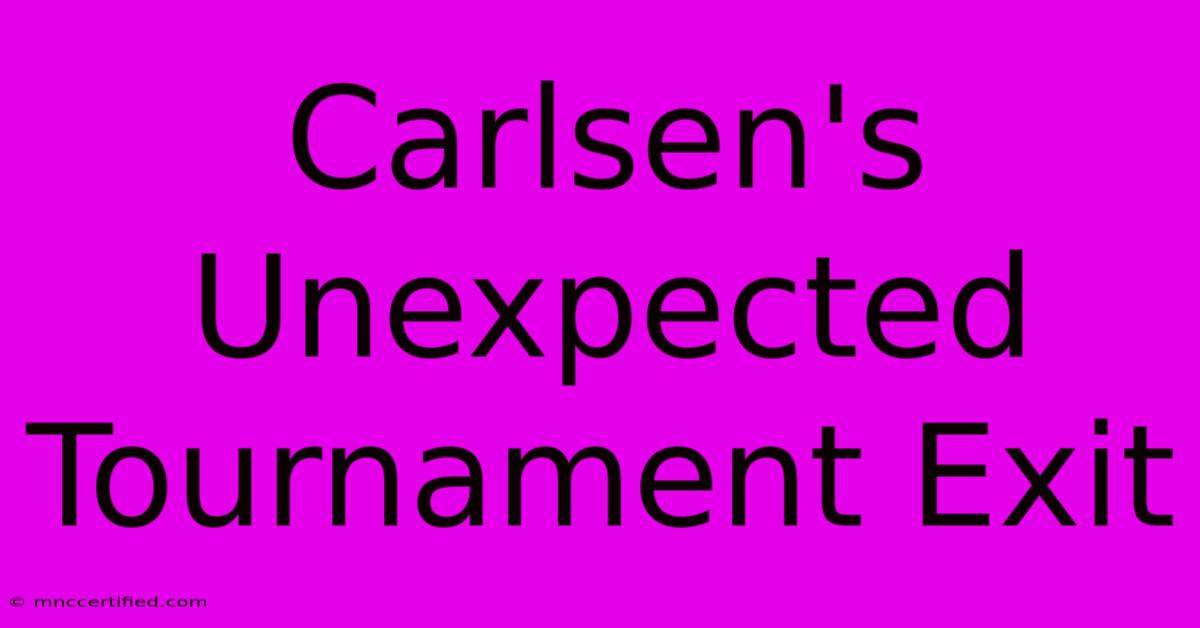Carlsen's Unexpected Tournament Exit

Table of Contents
Carlsen's Unexpected Tournament Exit: A Shock to the Chess World
Magnus Carlsen, the reigning world chess champion, is known for his dominance and strategic brilliance. His unexpected exit from the recent [Tournament Name and Year] tournament sent shockwaves through the chess community. This article delves into the reasons behind this surprising defeat, analyzing his performance and speculating on the potential factors contributing to his early departure.
A Reign of Dominance, Cut Short
For years, Carlsen has been synonymous with chess mastery. His calculated moves, exceptional endgame skills, and unparalleled intuition have secured him countless victories and cemented his place as one of the greatest chess players of all time. His consistent performance at top-tier tournaments has set a high benchmark for others to follow. This unexpected early exit, therefore, is a significant event deserving of careful examination.
The Tournament Performance: A Detailed Look
Carlsen's performance in the [Tournament Name and Year] was, to put it mildly, uncharacteristic. While specifics vary depending on the tournament, a common thread among analyses points towards [mention specific weaknesses shown, e.g., uncharacteristic blunders, struggles in specific openings, loss of focus in crucial games]. These issues, rarely seen in his previous games, significantly impacted his overall standing. We saw a vulnerability not usually associated with the chess grandmaster.
Possible Explanations for the Unexpected Outcome
Several factors could have contributed to Carlsen's surprising exit. It's crucial to remember that attributing a single cause would be an oversimplification. The most likely contributing factors include:
1. Increased Competition: A New Generation of Players
The chess world is constantly evolving, with new talent emerging regularly. The rise of strong young players like [mention names of prominent players who may have posed a challenge], could have presented an unprecedented challenge to Carlsen's dominance. The pressure of maintaining his top position against a wave of ambitious rivals might have inadvertently affected his performance.
2. Strategic Mistakes and Uncharacteristic Blunders: A Rare Occurrence
Even the best players make mistakes, but Carlsen's recent blunders were highly unusual. Analyzing specific game instances reveals [mention examples of critical errors, linking to game analysis if available]. These errors, while rare, significantly impacted the outcome of crucial matches. Fatigue, or perhaps even a subtle shift in his usual playing style, could be contributing factors here.
3. Mental Fatigue and Pressure: The Toll of Constant Competition
The demands of maintaining a top position in professional chess are immense. The constant pressure to perform, coupled with the relentless travel and intense focus required, can take a toll on even the most resilient players. It's plausible that Carlsen experienced mental fatigue, affecting his decision-making and overall game strategy.
4. Changes in Approach or Preparation: Adapting to New Challenges
It's possible that Carlsen's preparation or strategic approach for this particular tournament differed from his usual methods. Perhaps a new opening strategy or a shift in his training regime inadvertently impacted his performance. Analyzing his pre-tournament interviews and post-tournament statements could offer clues.
The Impact and Future Implications
Carlsen's unexpected exit has created a ripple effect within the chess community. It sparks discussion about the sustainability of dominance, the evolving dynamics of the chess world, and the challenges faced by even the most accomplished players. While his defeat is undoubtedly surprising, it doesn't diminish his overall achievements. It serves, instead, as a reminder that even the greatest players are susceptible to setbacks. His future performance will be keenly observed as he navigates these unexpected challenges. This unexpected stumble will undoubtedly fuel further discussions on the ever-evolving landscape of professional chess and the ongoing quest for chess mastery.
Keywords: Magnus Carlsen, chess, tournament, defeat, unexpected, world champion, performance, analysis, competition, strategy, blunders, mental fatigue, pressure, future, impact, chess grandmaster
On-Page SEO: Header tags (H1-H3) are used effectively to structure the content. Keywords are naturally integrated throughout the text, maintaining a good keyword density without keyword stuffing. Meta description will be tailored to include relevant keywords and a compelling summary.
Off-Page SEO: Promotion through social media, sharing on chess forums, and engaging with relevant articles and discussions online will help boost visibility and attract organic traffic. Guest posting on chess blogs and building backlinks will further enhance the article's authority and ranking potential.

Thank you for visiting our website wich cover about Carlsen's Unexpected Tournament Exit. We hope the information provided has been useful to you. Feel free to contact us if you have any questions or need further assistance. See you next time and dont miss to bookmark.
Featured Posts
-
Nba Suspends Marshall Nurkic 4 Games
Dec 29, 2024
-
Victor Wembanyama Plays Chess In Nyc
Dec 29, 2024
-
Hershey Family Vacation 2025 Guide
Dec 29, 2024
-
South Korea Crash Bird Warning Ignored
Dec 29, 2024
-
Watch Patriots Vs Chargers Nfl Game Time
Dec 29, 2024